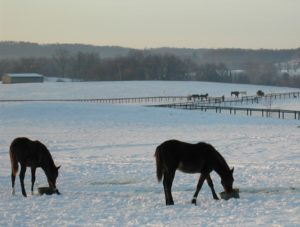Main Content

Photo courtesy of Dr. Carey Williams, Equine Extension Specialist, Rutgers University
The winter weather is here! How do we help our 4-legged friends maintain body weight and stay healthy in the cold? The Rutgers Equine Science Center has a Fact Sheet on that! Fact Sheet #1143 authored by Drs. Carey Williams and Sarah Ralston in February 2011 is very relevant for this topic.
Basically, winter feeding will vary depending on several factors for each animal:
- The condition of your horse (meaning body score). Is it well insulated with a good amount of body fat, or is it thin?
- How much natural coat does it have – was it allowed to grow a winter coat or was it kept inside most of the fall and/or clipped for shows and have little natural hair coat?
- What are the living conditions – does it live in the barn or outside with just a run-in shed? Can it get out of the wind? Very cold temperatures are made worse for animals if the wind chill brings the “feel like” temperatures extremely low, requiring more energy to keep warm.
- How much energy does the horse need for exercise? Do you have an indoor arena and ride every day or do you basically take the winter off for riding?
Fact Sheet #1143 goes into more detail, but the basics of winter feeding is making sure your horse has enough energy to stay warm and enough water for digestive processes to work normally. In general, cold winter temps may mean that your horse can require as much as 25% more energy. This should be in the form of increased forages (hay and hay supplements) more than grain. A discussion with your veterinarian may be in order.
How do you know if your horse is warm enough and getting enough energy? If a horse is shivering, it is cold and needs more protection from the weather, such as a wind break, blanket AND additional feed. Shivering takes energy. It is better to increase hay or forage than grain at this point. The digestive processes which take place when a horse eats hay and forage supplements produce a good amount of heat and energy for the animal.
Frozen water can be a big problem in the winter and lead to increased chance of colic. Make an effort to keep your water buckets from freezing over. Research has indicated that horses prefer warmer water in the winter and will drink more when it is warm than if it is really cold. If a horse is not drinking as much as it should, you could also try adding water to its feed or mash to increase water intake and digestibility.
More important details about winter feeding are listed in the Fact Sheet #1143. It also talks about mineral, vitamin, and other supplements which may be needed. Check it out!
Written by Carol K. Ward, County 4-H Agent, Rutgers Cooperative Extension and Dr. Carey Williams, Equine Extension Specialist, Rutgers University